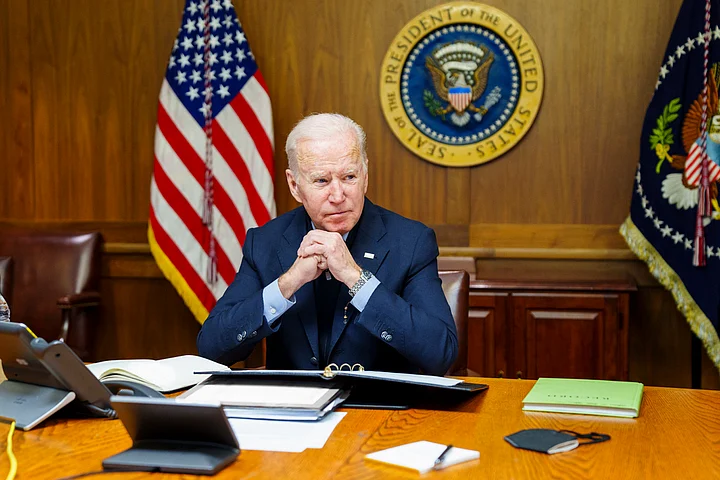United States President Joe Biden on Tuesday, 15 February, warned Russia of 'powerful sanctions' if Russian troops mustered along the Ukraine border go on the offensive.
Saying that US is also ready with diplomatic solutions, the President said, "The United States is prepared no matter what happens. We are ready with diplomacy," AFP quoted.
Earlier in the day, Moscow's ministry of Defence had claimed that some soldiers and military equipment were being shifted to their bases, away from the border, after the planned exercises were carried out.
However, disputing these claims, Biden said in his address:
"Analysts indicate that they [Russian troops] remain very much in a threatening position."
Meanwhile, President Vladimir Putin met with German Chancellor Olaf Scholz on Tuesday and reportedly declared that he did not want a war.
'Ready to Go Down the Negotiations Track': Vladimir Putin
"We are ready to work further together. We are ready to go down the negotiations track," Putin stated in a joint press conference with Scholz, AFP quoted.
While Washington rallied for proof of the supposed de-escalation along the borders, Biden re-iterated this and said, "We should give the diplomacy every chance to succeed," AFP reported.
'Russian Citizens, You Are Not Our Enemy': US
The US president also addressed speculation around Ukraine's entry into NATO and Russia's concerns over the matter, he said that the US has introduced "concrete ideas to establish a security environment in Europe."
Ensuring that Russia is not being threatened by US, NATO or Ukraine, he asserted that Russian citizens "are not our (US) enemy."
"And I do not believe you want a bloody, destructive war against Ukraine," the president added.
After meeting Putin, the German leader shut down the NATO-Ukraine speculations and ensured reporters that the country was not about to join the alliance.
"There is one fact: Ukraine joining NATO is not the order of the day," AFP quoted Scholz as saying.
Calling the concerns 'absurd', he added, "everyone has to take a step back and realize that we cannot have a military conflict over a question that is not on the agenda."
Russian Retreat Met With Doubt
The Russia Defence Ministry had announced on 15 February, that some troops deployed at the Ukrainian border were being withdrawn, in what seemed to be first major sign of de-escalation in the Russia-Ukraine border crisis.
Confirmation regarding the retreat wasn't provided by Ukrainian or NATO officials at the time.
NATO, however, remained quite doubtful regarding the withdrawal.
Jens Stoltenberg, the chief of the inter-governmental alliance whose expansion Russia supposedly fears, said that "We have not seen any sign of de-escalation on the ground".
Other officials of Western European countries such as the UK were less confused in their perception of the withdrawal.
"We see no sign of Russian de-escalation. We see the opposite", one British official said, reported The Guardian.
Analysts say that the important aspect of the 'withdrawal' would be to observe where the retreating troops go.
If they remain nearby, then "Russia will have the capacity to conduct a significant escalation, though possibly not on as short notice," analyst Robe Lee tweeted on Thursday.
The president of Rochan Consulting (independent aerospace and defence consulting firm), Konrad Muzyka, said that "previously announced withdrawals" had usually lead to "more Russian troop deployments near Ukraine", as quoted in The Guardian.
It would, therefore, take at least "a few days to verify" what was actually happening on the ground.
More than 100,000 Russian troops have been mobilised around the Ukrainian border for more than three months.
Russia has been demanding the removal of NATO troops from Eastern European countries that joined after 1997, and a guarantee that NATO would never induct Ukraine.
Putin sees this move as the US and Western European countries expanding their influence close to the Russian borders, and not the other way around as claimed by his rivals.
(With inputs from AFP and The Guardian.)
(At The Quint, we question everything. Play an active role in shaping our journalism by becoming a member today.)
